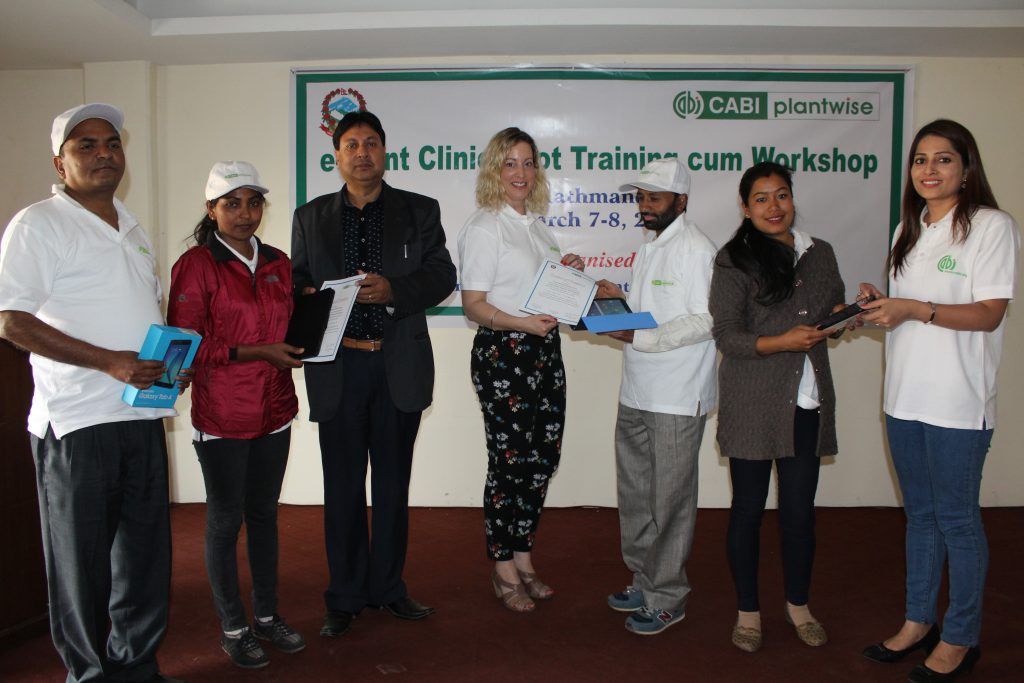South-South collaboration helps in the fight against invasive pests
Invasive species cause widespread devastation and huge economic losses to smallholder farmers across the world, especially in sub-Saharan in Africa. Invasive species not only directly undermine farmer’s ability to achieve food security, they also affect smallholder agribusiness making farmers unable to link to profitable food value chains and international agricultural trade networks.
Successful e-Plant Clinic launch in Nepal
E-plant clinic training commenced in Pokhara, Nepal, today, after a successful launch in Kathmandu earlier this week. ICT intervention for the country is funded by the Centre for Applied Crop Science (CACS), UK Government and training was inaugurated in Kathmandu by Dr. Suroj Pokharel, Secretary, Ministry of Agricultural Development and chaired by Sh. Dila Ram…
Challenges and Opportunities for Women Farmers in Nepal
In developing countries, rural women play a significant role in agriculture, accounting for 60-80% of food production and selling food products at markets [1]. In Nepal, it’s been reported that up to 98% of women are employed in the agricultural sector, a percentage which is higher than that for men (91%) [1b]. Contribution by women…
Our favourite recipes – Mozambique
Recipe courtesy of Joao A. Jeque Junior As part of our new mini-series “Our favourite recipes”, the second post has been written by Joao A. Jeque Junior, Plantwise knowledge bank intern from Mozambique. He tells us how to prepare Xiguinha de “mandioca” made from cassava. Xiguinha de “mandioca” Mandioca is the translated Portuguese name for…
One Health: Plantwise’s ambition to improve the health of people, plants and animals
Blog written by Léna Durocher-Granger and Solveig Danielsen One Health Day is held on the 3rd of November to highlight “the collaborative effort of multiple disciplines — working locally, nationally, and globally — to attain optimal health for people, animals and the environment” (One Health Initiative, 2016). Although One Health Initiative is focusing mainly on…
Our favourite recipes – Ghana
Recipe courtesy of Hannah Serwaa Numah Following Claire’s series of posts on ‘making the most of the Plantwise knowledge bank’, I’d now like to introduce our next mini-series, which asks our country partners for their favourite recipes using top crops brought into plant clinics in their countries, so we can share them with you! Our first…
Making the most of the knowledge bank: How to enhance your country’s content
Contributed by Léna Durocher-Granger and Kate Dey Are you perhaps a coffee expert, a research scientist, post-graduate student in crop management, an extension officer working at the Ministry of Agriculture? Would you like to contribute to the plant health system of your country, bring the Plantwise methodology to your institute, help us with the translation…
Grand Challenges – inspiring next generation plant pathologists
Julie Flood, Phil Taylor and Claire Beverley attended the ‘Grand Challenges in Plant Pathology study group’ event at the Doctoral Training Centre, University of Oxford, 14-16 September. The event was the first of its kind, aiming to engage and inspire the next generation of plant pathologists. The event was sponsored by the British Society of…
Plantwise partners hone their pathology skills during UK training course
For the fourth successive year, CABI UK Centre staff in June ran a four day training course on Techniques in Plant Pathology. Through lectures, demonstrations and practical sessions, the course provided a comprehensive overview of methods used for diagnosing plant health problems and for isolating, culturing and identifying fungi, bacteria, nematodes, viruses and phytoplasmas as…



